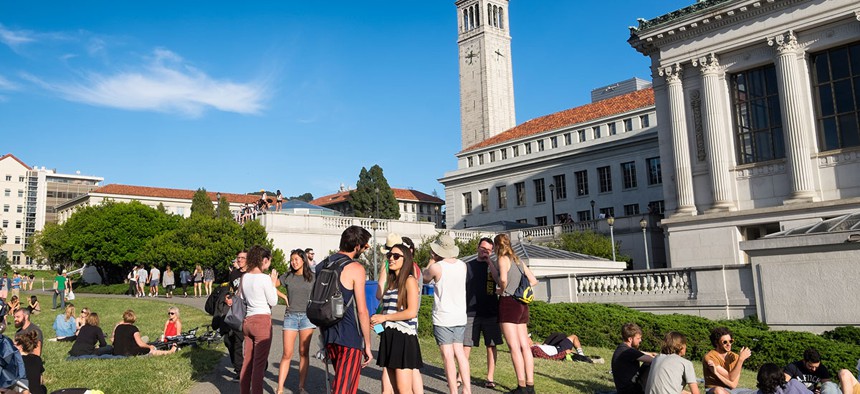Silicon Valley Hires the Most Alumni of These 10 Universities, And None of Them Are in the Ivy League

Students at the University of California, Berkeley. cdrin/Shutterstock.com
If you want to work in Silicon Valley, try going to school in California.
The most coveted jobs are in Silicon Valley, and most selective US universities are members of the Ivy League. So it stands to reason that tech giants like Apple, Google, Amazon and Facebook would scoop up best and brightest from those bastions of power and privilege.
Think again. None of the eight Ivy League schools—Harvard, Yale, Princeton, Brown, Columbia, Cornell, Dartmouth and the University of Pennsylvania—cracked the top 10 on a list of the universities sending the most graduates to tech firms, according to an analysis by HiringSolved, an online recruiting company. The company used data from more than 10,000 public profiles for tech workers hired or promoted into new positions in 2016 and the first two months of 2017.
Here are the schools with the most undergraduate and graduate alumni hired by the 25 biggest Silicon Valley employers in the last year:
| 1 University of California, Berkeley |
| 2 Stanford University |
| 3 Carnegie Mellon University |
| 4 University of Southern California |
| 5 The University of Texas at Austin |
| 6 Georgia Institute of Technology |
| 7 University of Illinois at Urbana-Champaign |
| 8 San Jose State University |
| 9 University of California, San Diego |
| 10 Arizona State University |
The two universities at the top are no surprise: Stanford and Berkeley are major computer science and engineering powerhouses in the Bay Area, and tech firms have close relationships with their faculty and administrators (former Stanford president John Hennessy founded a microprocessing company). They’re followed on the list by two private universities with strong engineering programs. The rest of the top 10 are public universities.
What all the schools in the top 10 share is size. The public universities on the list are among the largest in the US—Arizona State has almost 72,000 students, Texas has about 51,000—and their volume of engineering and computer science graduates make the universities attractive destinations for recruiters from firms hiring in big numbers. San Jose State alone has more than 7,000 engineering students in its 13 graduate and undergraduate programs—more than the total enrollment of Dartmouth.
It’s not until the next 15 universities that the first Ivy school, Cornell, appears, along with the Massachusetts Institute of Technology, one of the world’s premier universities for engineering.
Along with the big state schools, the next 15 also includes some anomalies, like the University of Waterloo, a Canadian school with strong ties to tech employers, and the University of Phoenix, a for-profit, online institution that has come under fire for its poor job placement record but still claims 213,000 students. Santa Clara, a small Catholic school, is located six miles from Apple’s headquarters.
While some of universities on the list are as selective at the Ivies, most are not. If the list tells us anything, it’s that admission to an elite university isn’t a prerequisite for a career in Silicon Valley, and what you know is more important than where you learn it.





